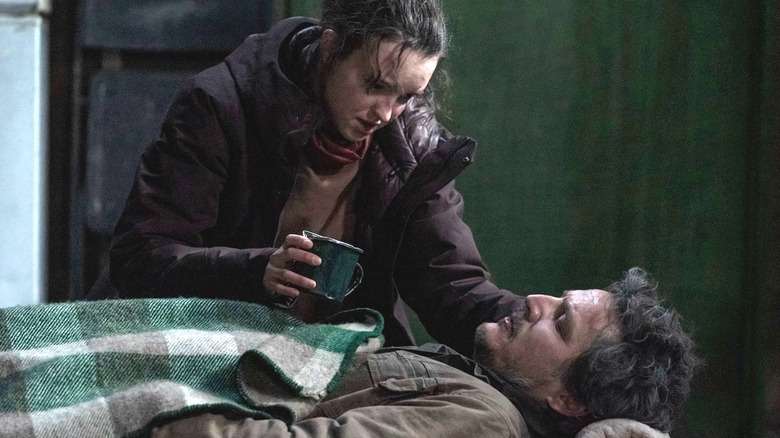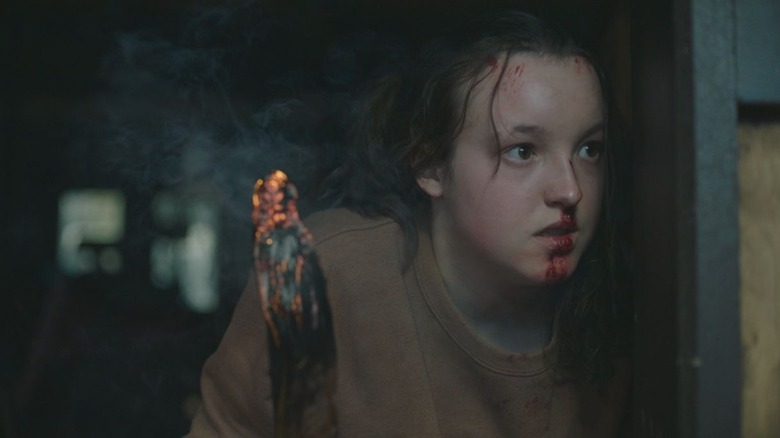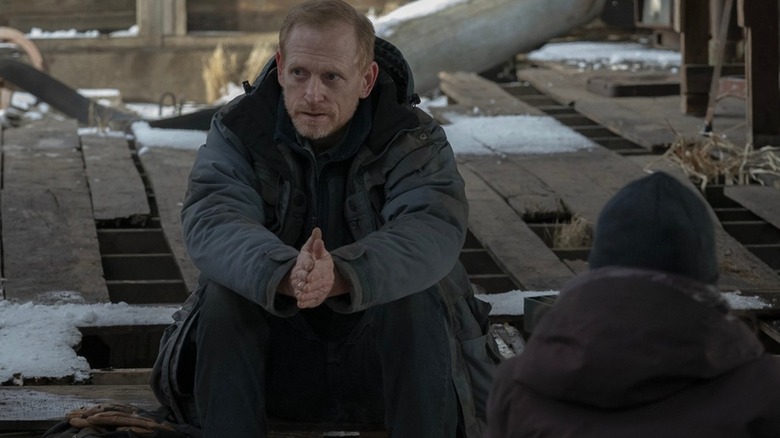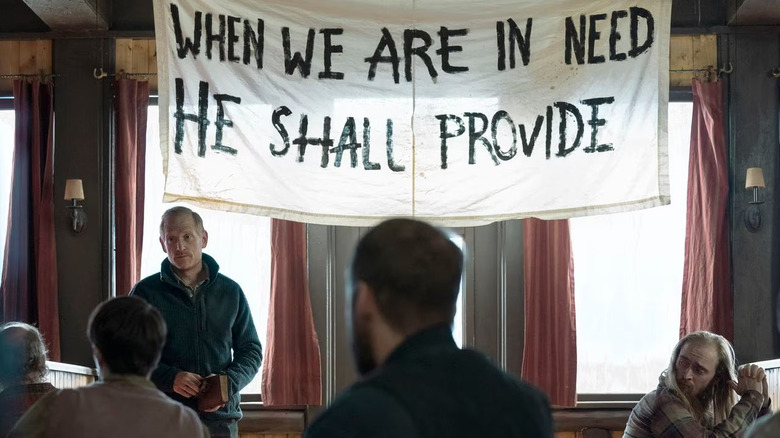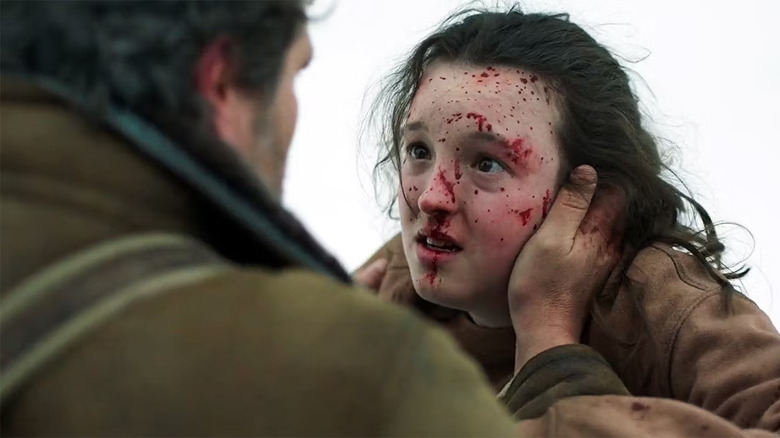How The Last Of Us Episode 8 Compares To The Original Video Game
This week's episode of "The Last of Us" epitomized the word "adaptation," taking the fewest detours from the game as any other episode. For that reason, "When We Are In Need" either felt satisfying or boring in its predictability for players of the game. I must, unfortunately, report that I fall into the latter opinion — but I should also disclose that I didn't like this section of the game, either.
Even still, one familiar piece of the game was inarguably gratifying to see this week, and that was Troy Baker playing James, David's (Scott Shepherd) right hand. Baker, who voiced Joel in the games, gave a serviceable performance of this character from the game up until his death. It was heartwarming to actually see him have his whole body available to act in the series rather than just his voice. And what a voice! It's simply unmistakable; I recognized it within two or three sentences. It was wonderful to hear the huskiness of Baker's Joel voice occasionally pierce through his own natural baritone while speaking. And generally, it was just really stinkin' cool to see him as part of the series.
His inclusion was just one of many direct-to-TV portrayals from the game.
Sticking to the script
I was shocked at how much was pulled from the game in episode 8. I'm not exaggerating when I say that easily 80 percent of the episode is copied — and I mean copied, from the order of events, set pieces, and dialogue — from the game. Part of me wonders if they phoned it in right before the finale. At the same time, it's hard to complain when there was such accuracy in the details. For example, Joel's blanket in the show looks exactly like the game version.
The sequence of events in the show was the same as the game. Ellie (Bella Ramsey) goes hunting, meets David and James, goes back to Joel, leads David and company away from their hideout, gets captured, eventually kills David, and escapes with Joel (Pedro Pascal). Much of the dialogue is taken directly from the game, including two of my favorite lines from Ellie and Joel.
For Ellie, she yells at David after breaking his finger, "Tell them Ellie is the little girl that broke your f***ing finger!"
For Joel, it was after he interrogated two of David's men about where Ellie was. After getting the truth from one of them by mutilating his leg and shanking him to death, he answers the other man who scolded him for killing his friend. Joel snarks, "That's alright. I believe him," before impaling him to death.
Viewers will recall this interrogation tactic being used throughout the season — pitting two allies against each other, testing both of them to tell the truth about a location on a map by having them both point to it one at a time. This is Joel's signature taken from the game, one that Ellie will inherit later in the series. But maintaining the dialogue specifically served to remind viewers of the viciousness within Ellie and Joel.
The smallest differences
The few changes made for the show were done so to account for the omission of gameplay, as well as for inconsequential character developments.
At the start of the episode, Ellie is hunting with a rifle. She still has the rifle when she encounters David and James and uses it to threaten them both. In the game, Ellie has a bow and arrow at first and takes the rifle from David later. A rifle is obviously a harsher weapon than a bow, so the writers clearly wanted HBO's Ellie to have a more imposing weapon. Gamers also know that archery is a common mechanic in games due to the precision it requires; it makes for varied and challenging gameplay. That component isn't necessary for TV, unless it is consistent with the time period.
In a similar vein, when Ellie and David sit together at a campfire after the meeting, clickers swarm outside their building. This prompts a gameplay section to defeat them. The series leaves the scene unencumbered by infected. The game had this sequence to break up the cutscene with action, but that's not necessary for TV. It did, however, function to create more trust in David for Ellie in the game, even if only temporarily.
Lastly, when Ellie discovers that David's crew has tracked her, she simply tells Joel she'll be back for him in the game before leading the group away. She doesn't leave Joel with a knife to defend himself from intruders. As such, in the game, Joel wakes up and leaves to find Ellie of his own volition. To contrast, Joel is found by one of David's men in the show but surprised and killed him before leaving to find Ellie. He left the hideout out of necessity rather than choice.
David's motivations
The 20 percent difference between game and show for this episode pertained to David.
To start, he's the first character that has a different appearance compared to the game. The game's version had dark brown hair on his head and face, while HBO's version had strawberry blonde hair. The series also provided a backstory to David and the cult he was running. The writers added a religious element to the group, having David describe himself as a preacher to his people. He explains that he is a "shepherd to sheep," and that he couldn't let his followers down by letting them starve. Thus ... cannibalism. There's a zealot quality to David in the show that didn't really exist in the game. What's more, the game's David appeared to turn to cannibalism for the sake of it — to survive rather than uphold an image.
Speaking of, I believe his physical image in the series compliments the god complex David exhibits. Society associates lighter hair and features with purity, and in (white) Christian religions, the ideal phenotype is very Aryan. The game's David, however, was meant to be more unsettling and dark, and thus he had dark hair to match this energy.
Kill or be killed
The final change made in episode 8 came at the end. In the game, as Ellie is stabbing David beyond the point of death, she is pulled away by Joel, who finally finds her. The series sees Ellie instead stop herself from stabbing David, but only after attacking him for a longer time than in the game. Joel then approaches Ellie outside of the diner. For those who've played the second game, I'd posit that the show's depiction of this scene is foreshadowing the kind of violence that Ellie is capable of when she's pushed past her emotional limit. Let's also not forget that Ellie has the angst and emotional intelligence of a teenager, so she can be truly unhinged under the right (or wrong) circumstances.
This episode was the climax portrayal of what Joel and Ellie will do to survive and protect one another. We saw both of them endanger their safety to shield the other from harm. It was the final test of love and loyalty before the two reach their final destination, and Joel's "job" is complete. But Joel might have realized by the end of this episode that Ellie is more than simply cargo.
She's his lifeline.
